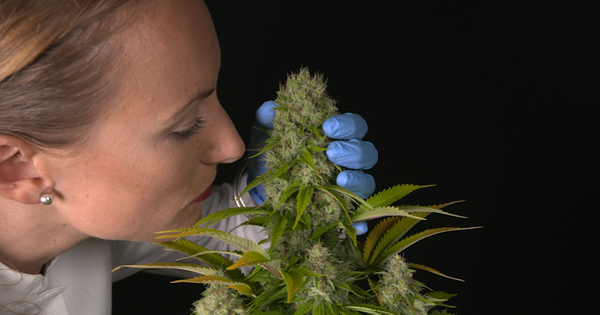- Terpenes are the compounds that give cannabis its distinct aroma.
- Besides having conquered the hearts – and noses – of both growers and users, these aromatic compounds come packed full of therapeutic properties that can be highly beneficial to health.
- One of cannabis’ main terpenes is linalool. Here is all you need to know about this compound and its myriad applications.

What is linalool?
Belonging to a group of substances known as cannabinoids, THC and CBD are by far cannabis' most well-known compounds, with most research attention focusing on them. The growing global moves towards legalisation, however, is fuelling interest in the plant's medicinal properties. As a result, we're now starting to understand that terpenes, too, can be powerful therapeutic tools. This is true also for Linalool, which is proving effective in the treatment of a number of diseases.
Linalool is one of over 200 known terpenes in cannabis's resin. This chemical compound, however, is not specific to marijuana, and can also be found in plants including mint, cinnamon, rosewood, laurel and birch. Besides giving these plants their distinctive aromas, terpenes are useful to them in many other ways.
As a secondary metabolite, linalool, is not essential for the development of plants, but plays a big part in how they adapt to the environment: it has antimicrobial properties that prevent bacterial growth in the leaves and flowers.
What does linalool smell like?
Linalool is one of the most widely used essential oils in cosmetics and perfumes, its scent being easily recognisable both by cannabis users and the wider public: a blend of lavender with spicy, flowery hints and a touch of mint.
What are the medical benefits of linalool?
Today, as the scientific research on terpenes moves forward, it is more evident than ever that there is great potential deriving from these compounds' therapeutic properties. Several studies have already indicated the benefits of linalool as the following:
- Antimicrobial: Linalool's antibacterial effect is beneficial not only to plants but potentially also to humans.
- Antidepressant and anti-anxiety: In a study on rodents, mice exposed to linalool vapours showed reduced levels of stress and anxiety, as well as greater capacity to stay calm and look for a way out in menacing, fearful situations.
- Makes the immune system more resilient to stress: Stress produces changes in the immune system cells. When faced with prolonged periods of stress, lymphocytes – or white cells – decrease and neutrophils increase, and this can make our organism more prone to disease. A study on rats showed that these changes were reduced following exposure to linalool, as the terpene seemingly activates the organism's parasympathetic response, helping prevent the physiological effects of stress and anxiety.
- Anticonvulsant: Another study found that linalool blocks the receptors that bind to glutamate, the immune system's main excitatory neurotransmitter, which is released by the neurons and the glial cells. This could be the reason why linalool proves effective in dealing with some cases of epilepsy.
- Anti-inflammatory: Some studies suggest that linalool has an anti-inflammatory effect on the body. This could be effective in treating chronic inflammation, which is thought to be one of the main causes of serious diseases including cancer and multiple sclerosis.
- Analgesic: The analgesic effect of linalool has been found to help manage pain in certain situations, providing patients with a natural alternative to traditional medicine.





Comments from our readers
There are no comments yet. Would you like to be the first?
Leave a comment!Did you like this post?
Your opinion about our seeds is very important to us and can help other users a lot (your email address won't be made public).